50 Wild Animals Name | Meaning & Image | Necessary Vocabulary
Wild Animals
Wild / waɪld / (ওআইল্ড্) adj [living or growing in natural conditions; not kept in a house or on a farm] (বন্য, বুনো): Wild animals/ flowers
Animal / ˈænɪml / (ˈএ্যানিম্ল্) n [a creature that is not a bird, a fish, a reptile, and insect or human] (প্রাণী): This animal can be trained to follow simple orders. Fish oils are less saturated fats than animal fats.
Wild Animals Related Necessary Vocabulary Note
Ø Train / treɪn / (ট্রেইˈন্) v {Pt. Pp. trained / treɪnd / (ট্রেইন্ড্)} [to teach or prepare a person or an animal the skills for a particular job or activity and/or by mental or physical exercise] (প্রশিক্ষণ দেওয়া/পাওয়া): They train dogs to sniff out drugs.
<NOUN> Trainee / ˌtreɪˈniː / (ট্রেইনী) n [a person who is learning and practicing the skills of a particular job] (প্রশিক্ষণার্থী): A trainee dentist/electrician
<NOUN> Trainer / ˈtreɪnər / (ˈট্রেইনএর্) n [a person who teaches people or animals to perform a particular job or skill well, or to do a particular sport] (প্রশিক্ষক; ওস্তাদ): Her trainer had decided she shouldn’t run in the race.
<NOUN> Training / ˈtreɪnɪŋ / (ˈট্রেইনিং) n [the process of learning the skills that you need to do a particular job or activity] (প্রশিক্ষণ): New staff has/receive a week’s training in how to use the computers.
Lion & Lioness
Lion / ˈlaɪən / (ˈলাইএন্) n {Fem. lioness} [a large powerful animal lion is a member of the big cat family, with some males exceeding 250kg in weight, it is the second-largest living cat after the tiger. The lion is a vulnerable species, having seen a major population decline in its African range of 30-50% per two decades during the second half of the twentieth century. Although the cause of the decline is not fully understood, habitat loss and conflicts with humans are currently the greatest causes of concern.
In the wild, lion seldom lives longer than 10 to 14 years, as injuries sustained from continual fighting with rival males greatly reduce their longevity. In captivity, they can live for more than 20 years. Lion mainly sleeps during the day, they are active primarily at night, although sometimes at twilight. They hunt in groups and lives in a part of Africa and Southern Asia. They have yellowish-brown fur and the male has a mane. Lions have been to breed with tigress to create hybrids called ligers] (সিংহ): a pride (= group) of a lioness
Ø <IDM> The lion’s share [the largest or best part of Sth when it is divided] (সিংহভাগ; সর্বাপেক্ষা বেশি অংশ): Reputable charities spend the lion’s share of donations on aid.
Ø Vulnerable / ˈvʌlnərəbl / (ˈভালনএরএব্ল্) adj [weak and easily hurt/attack physically or emotionally] (ক্ষতিগ্রস্ত হতে পারে এমন; অরক্ষিত): Old people are particularly vulnerable to the flu.
Ø Species / ˈspiːʃiːz / (ˈস্পীশীজ্) n [a group in which animals, plants, etc. that are able to breed with each other and produce healthy young are divided, smaller than a genius and identified by a Latin name] (প্রজাতি): a rare species of beetle.
Ø Population / ˌpɑːpjuˈleɪʃn / (ˌপাঃপিউˈলেইশ্ন্) n [a particular group of people or animals living in a particular area] (কোনোনির্দিষ্ট স্থানে বসবাসরত প্রাণী<মাছ, পশুপাখি>/ লোকসংখা): Oil spillages are disastrous for the fish population.
Ø Decline / dɪˈklaɪn / (ডিˈক্লাইন্) n [a continuous decrease in the number, value, quality, etc. of Sth] (ক্রমশ হ্রাস): The company reported a small decline in its profits.
<VERB> Decline / dɪˈklaɪn / (ডিˈক্লাইন্) v {Pt. Pp. declined / dɪˈklaɪnd / (ডিˈক্লাইনড্)} [to gradually become smaller, fewer, weaker, etc.] (ক্রমশ হ্রাস পাওয়া): Profits declined by 60% this year.
Ø Decade / ˈdekeɪd / (ˈডেকেইড্) n [a period of ten years, especially a continuous period, such as 1910 – 1919 or 2000 – 2009] (দশক): The first decade of the twentieth century.
Ø Habitat / ˈhæbɪtæt / (ˈহ্যাবিট্যাট্) n [the natural environment in which an animal or plant usually lives] (<উদ্ভিদ; জীবজন্তু সম্বন্ধে> স্বাভাবিক বিচরণ বা লালনক্ষেত্র; আবাস ভূমি): The panda’s natural habitat is the bamboo forest.
Ø Seldom / ˈseldəm / (ˈছেলডএম্) adv [not often] (কদাচিৎ; কালেভদ্রে): She seldom smiled.
<SYN> Rarely
Ø Injure / ˈɪndʒər / (ˈইন্জএর) v [to harm yourself or somebody else physically, especially in an accident] (আহত করা/ হওয়া): He was badly injured in the crash.
Ø Sustain / səˈsteɪn / (ছএˈছটেইন্) v {Pt. Pp. sustained // (ছএছটেইন্ড্)} [to suffer or experience, especially damage or loss] (<আঘাত ইত্যা> প্রাপ্ত হওয়া/ ভোগা): He sustained multiple injuries in the accident.
<SYN> Suffer
Ø Rival / ˈraɪvl / (ˈরাইভ্ল্) n [a person, group, or thing that competing with others for the same thing or in the same area] (প্রতিদ্বন্দ্বী): The company faces big rivals in Europe and Asia.
Ø Longevity / lɔːnˈdʒevəti / (লোনˈজেভএটি) n [long life; the fact of lasting a long time] (দীর্ঘজীবন; দীর্ঘায়ু): We wish you both health and longevity.
Ø Captivity / kæpˈtɪvəti / (ক্যাপˈটিভএটি) n [when a person or animal is kept somewhere and is not allowed to leave] (বন্দীদশা; বন্দিত্ব): Wild animals do not always breed well in captivity.
Ø Twilight / ˈtwaɪlaɪt / (ˈটোয়াইলাইট্) n [the faint light or the period of time at the end of the day after the sun has gone down] (<সন্ধ্যা বা ঊষার> গোধুলি; সন্ধ্যালোক): It was hard to see him clearly in the twilight.
Ø Fur / fɜːr / (ফা্র্) n [the soft thick mass of hair that grows on the body of some animals] (<কোনোকোনো প্রাণীর> লোম): She stroked the rabbit’s fur.
 |
| Mane |
Ø Mane / meɪn / (মেইন্) n [the long thick hair that grows along the top of a horse’s neck or around the face and neck of a lion] (সিংহ বা ঘোড়ার ঘাড়ের উপর লম্বা চুল বা কেশর): The horse’s mane streamed in the wind.
Ø Breed / briːd / (ব্রীড্) v {Pt. Pp. bred / bred / (ব্রেড্)} [(of animals) to have sex and produce young] (<প্রাণী সম্বন্ধে> প্রজনোন করা ও প্রসব করা): Many animals breed only at certain times of the year.
Ø Pride / praɪd / (প্রাইড্) n [a group of lions] (সিংহের দল):
Tiger
Tiger / ˈtaɪgər / (ˈটাইগএর্) n {Fem. tigress} [the tiger is the largest cat species, reaching a total body length of up to 3.88 and weighing up to 388.7kg in the wild. Its most recognizable feature is a pattern of dark vertical lines on reddish-orange fur with a lighter underside. They have muscular bodies with powerful forelegs, large heads, and long tails. Adult tigers lead largely solitary lives. They establish and maintain territories, but have much wider home ranges within which they roam. They live in part of Asia] (বাঘ; ব্যাঘ্র; শার্দুল): The zookeeper was savaged to death by a tiger. A tiger was often seen prowling around the village.
 |
| Weigh |
Ø Weigh / weɪ / (ওএই) v {Pt. Pp. weighed / weɪd / (ওএইড্)} [to have a particular weight or to measure how heavy Sb/Sth is, usually by using scales] (ওজন করা/হওয়া; ভার নির্ণয় করা; মাপা): The average male tiger weighs around 200 kg. He weighs 60 kilos.
<NOUN> Weight / weɪt / (ওএইট্) n [how heavy Sb/Sth is, which can be measured in, for example, kilograms or pounds] (ওজন; ভার): What weight can this lorry safely carry? It is about 75 kilos in weight.
Ø Recognizable / ˈrekəgnaɪzəbl / (ˈরেকএগনাইজএব্ল্) adj [easy to know or identify] (সহজে চেনা যায় এমন): After so many years she was still immediately recognizable.
Ø Line / laɪn / (লাইন্) n [a long thin mark on the surface of something] (রেখা): Sign your name on the dotted line.
 |
| Foreleg |
Ø Foreleg / ˈfɔːrleg / (ˈফোরলেগ্) n {also Forelimb} [either of two front legs of an animal that has four legs] (<চতুষ্পদ জন্তুর> সামনের পা; অগ্রপদ):
Ø Solitary / ˈsɑːləteri / (ˈছাঃলএটোরি) adj [(of a person or an animal) enjoying being alone; frequently spending time alone] (একাকী; নিঃসঙ্গ; নির্জন): Tigers are solitary animals.
Ø Territory / ˈterətɔːri / (ˈটেরএটোরি) n [an area that one person, group, animal, etc. consider as their own and defends against others who try to enter it] (ভূখণ্ড; অঞ্চল; এলাকা):
Ø Range / reɪndʒ / (রেইন্জ্) n [the distance over which Sth can be seen or heard] (দৃষ্টির/শ্রবণের পরিসীমা): The child was now out of range of vision.
Ø Roam / roʊm / (রৌম্) v {Pt. Pp. roamed / roʊmd / (রৌম্ড্)} [to walk or travel around an area without any definite aim or direction] (লক্ষ্যহীন ভাবে ঘুড়ে বড়ানো; আড্ডা মারা): The animals were allowed here to roam free.
<SYN> Wander
Ø Savage / ˈsævɪʒ / (ˈছ্যাভিজ্) adj {Pt. Pp. savaged / ˈsævɪʒd / (ছ্যাভিজ্ড্)} [(of an animal) to attack Sb violently, causing serious injury] (<প্রাণী সম্বন্ধে> আক্রমণ করে দংশন ও পদদলিত করা): He was savaged to death by a bear.
Ø Prowl / praʊl / (প্রাউল্) adj {Pt. Pp. prowled / praʊld / (প্রাউল্ড্)} [to move around quietly in an area trying not to be seen or heard, such as when hunting] (<প্রানী> শিকারের সন্ধানে বা চুরি করার উদ্দেশ্যে পরিভ্রমণ করা; খাদ্যান্বেষণ করা): At night, scorpions prowl the desert for insects.
Cheetah
Cheetah / ˈtʃiːtə / (ˈচীটএ) n [they are also known as the hunting leopard, is a big cat that occurs mainly in eastern and southern Africa and a few parts of Iran. The cheetah is characterized by a slender body, deep chest, spotted fur, a small rounded head, black tear-like streaks on the face, long thin legs and long spotted tail. They reach nearly 70 to 90 centimeters (28 to 35in) at the shoulder and weighs about 21-72 kilograms
Cheetah is active mainly during the daytime; hunting is the major activity. They can run faster than any other animal. They will stalk their prey to within 100-300 meters, charge towards it and bite its throat suffocate it to death] (চিটাবাঘ; চিতা):
Ø Occur / əkɜːr / (একা্র্) v {+ adv. /prep.} [to exist or be present in, among, etc.] (থাকা; দৃষ্ট হওয়া): Sugar occurs naturally in fruit.
Ø Slender / ˈslendər / (ˈস্লেনডএর্) adj [thin or narrow] (সরু): The plant’s leaves are long and slender.
<SYN> Slim
Ø Streak / striːk / (স্ট্রীক্) n [a long thin mark or line which is easily noticed because it is very different from the area surrounding it] (আঁকাবাঁকা ডোরা সরু দাগ): There was a streak of blood on his face.
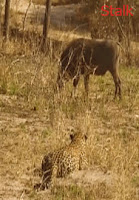 |
| 1. Stalk |
Ø Stalk / stɔːk / (স্টোক্) v 1. [to move slowly and quietly towards an animal or a person, in order to kill, catch or harm it or them] (শান্ত ও সর্তক পদক্ষেপে <শিকারের পশুর নিকটে> গমন করা): The lion was stalking a zebra.
 |
| 2. Stalk |
2. Stalk / stɔːk / (স্টোক্) n [a thin stem that supports a leaf, flower or fruit and joins it to another part of the plant or tree; the main stem of a plant] (বৃন্ত; ফলবৃন্ত; বোঁটা): We ate the apple, stalk and all.
Ø Charge / tʃɑːrdʒ / (চাঃর্জ্) v {Pt. Pp. charged / tʃɑːrdʒd / (চাঃর্জ্ড্)} [to rush forward and attack Sb/Sth] (ছুটেগিয়ে আক্রমণ করা): The bull put its head down and charged.
Ø Suffocate / ˈsʌfəkeɪt / (ˈছাফএকেইট্) {Pt. Pp. suffocated // (ছাফএকেইটিড্)} [to die because there is no air to breathe or to kill Sb by not letting them breathe air] (শ্বাস রোধ করা/হওয়া; শ্বাস রোধ করে মারা): He suffocated her by holding a pillow over her head.
Leopard
Leopard / ˈlepərd / (ˈলেপএরড্) n [it is a member of the cat family with a wide range in regions of sub-Saharan Africa, West Asia, the Middle East, South and Southeast Asia to Siberia, and Europe. Leopard has relatively short legs and a long body with a large skull. It is similar in appearance to the Jaguar, but is smaller and more lightly built. Its fur is marked with rosettes similar to those of the Jaguar, but the Leopard’s rosettes are smaller and more densely packed and do not usually have central spots like the Jaguar’s do.
The leopard’s success in the wild is due to its well-camouflaged fur; its hunting behavior, broad diet, and strength to move heavy carcass into trees] (চিতাবাঘ; গুলবাঘ):
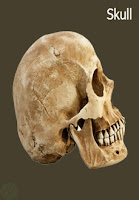 |
| Skull |
Ø Skull / skʌl / (স্কাল্) n [the bone structure forms the head and surrounds and protects the brain] (মাথার খুলি; করোটি): A fractured skull
<SYN> Cranium
Ø Appearance / əˈpɪrəns / (এˈফিএরএন্ছ্) n [the way that Sb/Sth looks on the outside; what Sb/Sth seems to be] (দৃষ্টিগোচরতা; চেহারা; উদয়; আবির্ভাব): the physical/outward/external appearance of Sth
Ø Mark / mɑːrk / (মাঃর্ক্) v {Pt. Pp. marked / mɑːrkt / (মাঃর্ক্ট্)} [to write or draw a symbol, line, etc. on Sth in order to give information about it] (দাগ, চিহ্ন বা ছাপ দেওয়া): Prices are marked on the goods.
 |
| Rosette |
Ø Rosette / roʊˈzet / (রৌˈজেট্) n [a flower-shaped decorative object, made of ribbon that is worn as a sign that you support a political party or sports team, or to show that Sb has won a prize] (ফিতা দ্বারা সজ্জিত গোলাপাকৃতি চিহ্ন/ ব্যাজ): The leaves formed a dark green rosette.
Ø Pack / pæk / (প্যাক্) v {Pt. P. packed / pækt / (প্যাক্ট্)} [to fill Sth with a lot of things] (<কোনোকিছু দিয়ে> ঠেসে পূর্ণ করা): Thousands of fans are packed in the stadium.
<ADJ> Packed / pækt / (প্যাক্ট্) adj [extremely full of a particular thing] (<কোনোকিছু দিয়ে> ঠাসা): The book is packed with information.
 |
| Camouflage |
Ø Camouflage / ˈkæməflɑːʒ / (ˈক্যামএফ্লাঃজ্) n [the way in which an animal’s color or shape matches its surroundings and makes it difficult to see] (ছদ্মবেশ; কুটবেশ): The leopard’s spots act as a camouflage.
<VERB> Camouflage / ˈkæməflɑːʒ / (ˈক্যামএফ্লাঃজ্) v [to hide Sb/Sth making them or it looks like the things around or like Sth else] (ছদ্মবেশ ধারণ করা; চোখে ধুলা দেওয়া; কূটবেশ ধারণ করা): The soldiers camouflaged themselves with leaves.
Ø Carcass / ˈkɑːrkəs / (ˈকাঃরকএছ্) n [the dead body of an animal, especially is a large one that is soon to be cut up as meat or eaten by wild animals] (পশুর মৃতদেহ): Vultures flew around in the sky waiting to pick at the rotting carcass of the deer.
Jaguar
Jaguar / ˈdʒægjuər / (ˈজ্যাগিউএর) n [it is a big cat and third-largest feline after the tiger and the lion. This spotted cat most closely resembles the Leopard physically, although it lives usually swamps and wooded regions, Jaguar also lives in scrublands and deserts. They have an exceptionally powerful bite, even relative to the other big eats. This allows it to pierce the shells of armored reptiles and to employ an unusual killing method] (জাগুয়ার):
Ø Feline / ˈfiːlaɪn / (ˈফীলাইন্) adj [like a cat; connected with an animal of the cat family] (বিড়ালজাতীয়; বিড়ালের ন্যায়): a wildlife park with tigers and various other felines.
Ø Resemble / rɪˈzembl / (রিˈজেমব্ল্) v {Pt. Pp. resembled / rɪˈzembld / (রিজেমবল্ড্)} [to look like or be similar to another person or thing] (<চেহারায়> মিল হওয়া; একই রকম দেখতে): After the earthquake, the city resembled a battlefield.
Ø Swamp / swɑːmp / (ছোআম্প্) n [an area of ground that is very wet<ভেজা> or covered with water and in which plants, trees, etc. growing] (জলা; জলাভূমি): The country contains around 700 square km of a swamp.
<SYN> Marsh
Ø Wooded / ˈwʊdɪd / (ˈউউডিড্) adj [(of land) covered with trees] (বৃক্ষদ্বারা আচ্ছাদিত; গাছে ঢাকা): a thickly wooded area. Wooded hills
Ø Scrubland / ˈskrʌblənd / (ˈস্ক্রাব্লএনড্) n [an area of dry land covered with small bushes and trees] (করকটে ভূমি ও বনবাদড়):
 |
| Pierce |
Ø Pierce / pɪrs / (পিএরছ্) v {Pt. Pp. pierced / pɪrst / (পিএরছ্ট্)} [to make a small hole in Sth, or to go through Sth, with a sharp point] (<কোনো সূচ্যগ্র বস্তুর সাহায্যে> ছিদ্র করা/ ফুটা করা): I could not wear these dangle earring because my ears aren’t pierced.
Ø Shell / ʃel / (শেল্) n [the hard outer part of eggs, nuts, some seeds, and some animals] (খোসা; খোলা; বর্ম): The garden was littered with empty snail shells.
Ø Employ / ɪmˈplɔɪ / (ইমˈপ্লই) v {Pt. Pp. employed / ɪmˈplɔɪd / (ইমপ্লইড্)} [to use Sth such as a skill, method, etc. for a particular purpose] (কাজে লাগানো; সদ্ব্যবহার করা): The cop had to employ force to enter the building.
Ø Unusual / ʌnˈjuːʒuəl / (আনˈইঊজুএল্) adj [different from what is usual or normal] (অস্বাভাবিক; অসাধারণ; লক্ষণীয়): He has a very unusual name.
<SYN> Uncommon
Panther
Panther / ˈpænθər / (ˈপ্যানথএর্) n [a large wild cat is a member of the cat family, also known as a black panther, native to Asia, Africa, and America, they are an elusive and powerful animal that has adapted well to a variety of habitats around the world, and is known to be one of the strongest climbers of all felines. They are considered to be endangered by many due to the declining numbers of both Leopard and Jaguars throughout much of their natural range] (প্যানথার; কালোচিতা):
Ø Elusive / iˈluːsɪv / (ইˈলূছিভ্) adj [difficult to find, define, achieve or remember] (অধরা; পলায়নপর; ধরা ছোয়ার বাইরে): Success, however, remained elusive for her.
Ø Adapt / əˈdæpt / (এˈড্যাপ্ট্) v {Pt. Pp. adapted / əˈdæptɪd / (এড্যাপ্টিড্)} [to change something to suit different conditions or uses] (খাপ খাওয়ানো; মানাইয়া লওয়া; অভিযোজন করা): We have had to adapt quickly to the system.
<SYN> Adjust
Ø Climber / ˈklaɪmər / (ˈক্লাইমএর্) n [a person who climbs (especially mountains) or an animal that climbs] (আহোরণ কারী): Monkeys are efficient climbers.
Ø Endanger / ɪnˈdeɪndʒər / (ইনˈডেইনজএর্) v {Pt. Pp. endangered / ɪnˈdeɪndʒərd / (ইনডেইনজএর্ড্)} [to put Sb/Sth in a situation in which they could be harmed or damaged] (বিপন্ন করা; বিপদে ফেলা): The sea turtle is an endangered species.
Puma
Puma / ˈpuːmə / (ˈপূমএ) n {also USA cougar} [it is a large, wild, secretive cat. They are also commonly known as cougar’s lions, and are able to reach larger sizes than other big cat individuals] (পুমা; বাদামি বিড়াল):
Ø Secretive / ˈsiːkrətɪv / (ˈছীক্রএটিভ্) adj [tending or liking to hide your thoughts, feelings, ideas, etc. from other people] (গোপনতাপ্রিয়; নিজের চিন্তা, অনুভূতি অভিপ্রায় ইত্যাদি লুকানোর প্রবণতাবিশিষ্ট): He is being very secretive about his new girlfriend.
Hyena
Hyena / haɪˈiːnə / (হাইˈঈনএ) n [a wild animal like a dog, native to parts of both Africa and Asia, there are four known species of hyena, the spotted hyena, the striped hyena, the brown hyena, and the aardwolf hyena. They are scavenger mammals, meaning that the hyena tends to eat that already another animal kill, rather than the hyena actually catching its own food. The hyena is well known for its cackling laugh like a scream, which the hyena is believed to use in order to alert another hyena of a source of food. This call is thought to be able to be heard by other hyenas for up to three miles] (হায়না; গোবাঘ; তরক্ষু): Hyena makes a sound similar to an unpleasant human laugh.
Ø Native / ˈneɪtɪv / (ˈনেইটিভ্) adj {~ (to)} [describes plants and animals which grow naturally in a place, and have not been brought there from somewhere else] (কোনো বিশেষ এলাকার স্বাভাবিক প্রাণী বা উদ্ভিদ; দেশজ্): The tiger is native to India.
<SYN> Indigenous
Ø Scavenge / ˈskævɪndʒ / (ˈস্ক্যাভিন্জ্) v [(of animals or birds) to eat dead animals that have been killed by another animal, or by a bus, etc.] (<পাখি বা প্রাণী সম্বন্ধে> মৃত প্রাণীর মাংস খাওয়া): Some fish scavenge on dead fish in the wild.
<NOUN> Scavenger / ˈskævɪndʒər / (ˈস্ক্যাভিনজএর্) n [a bird or animal which feeds on dead animals which have been killed by another animal] (মরা ও পচা প্রাণীর মাংস খেয়ে যেসব পশু বা পাখি জীবণধারণ করে; শবালী প্রাণী):
Ø Mammal / ˈmæml / (ˈম্যামল্) n [any animal of which the female gives birth to babies, not egg, and feeds them on milk from her own body] (স্তন্যপায়ী প্রাণী): Cows, humans, and bats are all mammals, but birds, fish, and crocodiles are not.
 |
| 1. Cackle |
Ø Cackle / ˈkækl / (ˈক্যাক্ল্) v 1 [(of a chicken) to make a loud unpleasant noise] (<মুরগি সম্বন্ধে> কক কক/ প্যাঁক প্যাঁক শব্দ করা): The hens cackled in alarm.
 |
| Cackle |
2. Cackle / ˈkækl / (ˈক্যাক্ল্) v [to laugh in a loud unpleasant way] (উচ্চসরে হাসা): A group of women was cackling in a corner.
Ø Scream / skriːm / (স্ক্রীম্) v {Pt. Pp. screamed // (স্ক্রীম্ড্)} [to give a loud, high cry, because you are hurt, frightened, excited, etc.] (<ভয়ে বা বেদনায়> চিৎকার/আর্তনাদ করে ওঠা; চেঁচিয়ে ওঠা): Through the smoke, the rescuers could hear people screaming for help.
<SYN> Shriek
Wolf
Wolf / wʊlf / (উউল্ফ্) n [the wolf, also known as the gray wolf, timber wolf or western wolf, is a large, wild animal of the dog family, that lives and hunts in groups, native to the wilderness and remote areas of Eurasia and North America. It is the largest extant member of its family, with males averaging 43-45kg, and female 36-38kg. They are legendary because of their spine-tingling howl, which they use to communicate. Lone wolf howls to attract the attention of his pack] (নেকড়ে): We could hear wolves howling in the distance.
Ø Wilderness / ˈwɪldərnəs / (ˈউইলডএরনএছ্) n [a large area of land that has never been developed or used for growing crops because it is difficult to live there] (ঊষর জনহীন প্রান্তর; তেপান্তর): Alaska is the last great wilderness.
Ø Extant / ekˈstænt / (একˈছট্যান্ট্) adj [describes something very old that is still existing] (আদ্যাপি বর্তমান; <পুরাতন> একখনও বিদ্যমান): We have some extant parish records from the sixteenth century.
Ø Legendary / ˈledʒənderi / (ˈলেজএনডেরি) adj [very famous and talked about a lot by people, especially in a way that shows admiration] (পৌরাণিক সুখ্যাত): Her patience and tact are legendary.
Ø Spine-tingling / ˈspaɪn- tɪŋlɪŋ / (ˈস্পাইন-টিঙ্লিঙ্) adj [(of an event) enjoyable because it is very exciting or frightening] (শরীর শিউরানো রোমাঞ্চকর): He told them a spine-tingling ghost story.
Ø Howl / haʊl / (হাউল্) v {Pt. Pp. howled / haʊld / (হাউল্ড্)} [(of a dog, wolf, etc.) to make a long, loud cry] (<কুকুর বা নেকড়ে সম্বন্ধে> গর্জন/ হুঙ্কার করা): In the silence of the night, a lone wolf howled.
Ø Lone / loʊn / (লৌন্) adj [alone or without any other people or things] (নির্জন; একাকী; নিঃসঙ্গ): a lone survivor
<SYN> Solitary
Ø Pack / pæk / (প্যাক্) n [a group of animals that hunt together or are kept for hunting] (<একত্রে শিকার করা> প্রানীর দল): a pack of wild dogs. Wolves hunting in packs
Coyote
Coyote / ˈkaɪoʊt / (ˈক্যাইওউট্) n [a small wild animal of the dog family which lives in North America] (বন-কুকুর):
Jackal
Jackal / ˈdʒækl / (ˈজ্যাক্ল্) n [a wild animal jackal is a small omnivorous mammal of the genus Canis, which also includes the wolf and dog, originally found in Africa, Asia, and southeast Europe. Their long legs and curved canine tooth are adapted for hunting small mammals and birds, and their large feet and fused leg bones give them a physique well-suited for long-distance running] (শেয়াল; শৃগাল; ফেরু):
Ø Omnivorous / ɑːmˈnɪvərəs / (আঃমˈনিভএরএছ্) adj [eating all types of food, especially both plants and meat] (সর্বভূক; সর্বভোজী): Pigs are omnivorous animals.
Ø Genus / ˈdʒiːnəs / (ˈজীনএছ্) n [a group of animals or plants, more closely related than a family, but less similar than a species] (প্রকার, জাত বা ধরণ; শ্রেণী):
 |
| Canine tooth |
Ø Canine tooth / ˈkeɪnaɪn tuːθ / (ˈকেইনাইন্ টূথ্) n [one of the four pointed teeth in the front of a human’s or animal’s mouth] (<মানুষের বা পশুর> ছেদক দন্ত):
Ø Fuse / fjuːz / (ফিউজ্) v [two things are joined together to form a single thing] (<জোড়া দিয়ে> একীভূত করা): The bones of the skull are not properly fused at birth.
Ø Physique / fɪˈziːk / (ফিˈজীক্) n [the size and shape of a body] (দৈহিক গঠন): She doesn’t have the physique to be a dancer.
<SYN> Build
Fox
Fox / fɑːks / (ফাঃকছ্) n [a wild mammal fox is small-to-medium sized, omnivorous animals belonging to the dog family. They are slightly smaller than a medium-size domestic dog, with a flattened skull, upright triangular ears, a pointed, slightly upturned snout, and a long, wide, bushy tail] (খেঁকশিয়াল; শিবা):
Ø <PHR-V> Belong to [to be part of a particular group type or system] (<কোনোকিছুর> অংশ): Lions and tigers belong to the cat family.
Ø Flatten / ˈflætn / (ˈফ্ল্যাট্ন্) v {Pt. Pp. flattened / ˈflætnd / (ফ্ল্যাট্ন্ড্)} [to become level and thinner or to cause something to become level and thinner] (চেপ্টা করা/হওয়া): The bird is recognizable by its flattened beak.
Ø Upright / ˈʌpraɪt / (ˈআপরাইট্) adj [straight up or vertical position] (খাড়া; সিধা): Keep the bottle upright.
Ø Triangle /ˈtraɪæŋgl / (ˈট্রাইএ্যাঙগ্ল্) n [a flat shape with three straight sides and three angles] (ত্রিভুজ): Cut the cake into a triangle.
<ADJ> Triangular / traɪˈæŋgjələr / (ট্রাইˈএ্যাঙগিউলএর্) adj [shaped like a triangle] (ত্রিভুজাকৃতি): The play is performed on a triangular stage.
Ø Upturned / ˌʌpˈtɜːrnd / (ˌআপˈটা্র্ন্ড্) adj [pointing or facing upwards] (ওপরদিকে-তোলা): She looked down at the sea of upturned faces. An upturned nose
 |
| Snout |
Ø Snout / snaʊt / (স্নাউট্) n [the long nose and mouth which stick out from the face of some animals] (<কোনো কোনো প্রাণীর> বাইরের দিকে বেড়িয়ে থাকা নাক): a pig’s snout
Ø Bushy / bʊʃi / (বুশি) adj [(of hair or fur) growing thickly] (ঘন; ঝোপঝাড় ময়; লোমশ): a bushy beard/tail/ eyebrows
Hippopotamus
Hippopotamus / ˌhɪpəˈpɑːtəməs / (ˌহিপএˈপাঃটএমএছ্) n [a large semi-aquatic mammal with thick dark skin and short legs that is found wallowing in the rivers and lakes across sub-Saharan Africa. They are easily recognizable by their barrel-shaped trunks, wide-opening mouth with large tusks, nearly hairless bodies, column-like legs, and large size; adults average 1,500 kg and 1,300 kg for males and females respectively] (জলহস্তী):
Ø Aquatic / əˈkwætɪk / (একোঅ্যাটিক্) adj [growing or living in, or connected with water] (জলজ উদ্ভিদ, প্রাণী ইত্যাদি বিষয়ক): aquatic plants/life/sports
<ADJ> Semi – aquatic / ˈsemi- əˈkwætɪk / (ˈছেমি- এˈকোঅ্যাটিক্) adj [] (অর্ধ – জলজ; আধা-জলজ):
Ø Wallow / ˈwɑːloʊ / (ˈওআঃলৌ) v [(of large animals or people) to lie and roll about in the water, sand or mud, to keep cool or for pleasure] (<কাদা, বালু, পানি ইত্যাদিতে> গড়াগড়ি দেওয়া): Hippos wallowing in mud.
 |
| Barrel |
Ø Barrel / ˈbærəl / (ˈব্যারএল্) n [a large round container, usually made of wood or metal, with flat ends and, usually, curved sides that make it fatter in the middle] (কাঠ বা প্লাস্টিকের তৈরি, গোলাকার আধার বিশেষ; পিপা; ব্যারেল): They drank a whole barrel of beer at the party.
 |
| Trunk |
Ø Trunk / trʌnk / (ট্রাঙ্ক্) n 1. [the main part of the human/animal body, not including the head, legs or arms] (হাত পা ও মস্তকবিহীন শরীর; দেহকাণ্ড; ধড়; মধ্যশরীর): The airbag will protect the head and trunk.
Rhinoceros
Rhinoceros / raɪˈnɑːsərəs / (রাইˈনাঃছএরএছ্) n [rhinoceros, meaning “nose horn”, often abbreviated to rhino, is a large, heavy, herbivore mammal native to Africa and Asia. They are thought to be the biggest land mammal in the world behind the African elephant, now considered to be critically endangered. They are averaging about 1.5 tons in weight, and has a large horn in the middle of its face] (গণ্ডার):
Ø Abbreviate / əˈbriːvieɪt / (এব্রীভিএইট্) v [to make a word, phrase or name shorter by using only the first letters of each word] (<কোনো শব্দ; পদবি ইত্যাদি> সংক্ষিপ্ত করা): ‘Chief Executive officer’ is abbreviated as ‘CEO’.
<SYN> Shorten
<NOUN> Abbreviation / əˌbriːviˈeɪʃn / (এˌব্রীভিˈএইশ্ন্) n [a short form of a word, etc.] (সংক্ষেপকরণ): ‘ITV” is the abbreviation for ‘Independent Television’.
Ø Herbivore / ˈhɜːrbɪvɔːr / (ˈহা্র্বিভোর্) n [any animal that eats only plants] (তৃণ-ভোজী প্রাণী): Cows and sheep are herbivores.
Panda
Panda / ˈpændə / (ˈপ্যান্ডএ) n {Also. giant panda} [the giant panda, also known as panda bear or simply panda, is a black and white animal like a bear, native to south-central China. They are easily recognized by the large, distinctive black patches around its eyes, over the ears, and across its round body. Its diet is over 99% bamboo, but in the wild, occasionally eat other grasses, wild tubers, or even meat in the form of birds, rodents or carrion. In captivity, they may receive honey, eggs, fish, yams, shrub leaves, oranges, or bananas along with specially prepared food] (পান্ডা):
Ø Distinctive / dɪˈstɪŋktɪv / (ডিˈছটিঙ্কটিভ্) adj [having a quality or characteristic that makes Sth different and easily noticed] (পার্থক্যসূচক; স্বাতন্ত্রসূচক): ‘i’ and ‘iː’ are two distinct vowel sounds in English.
Ø Patch / pætʃ / (প্যাচ্) n [a small area of Sth, especially one which is different from the area around it] (তালি): Our dog has a black patch on his back.
Bear
Bear / beər / (বেএর্) n [it is a large, strong dog like mammals with a thick fur coat that lives, especially in colder parts of Europe, Asia, and North America. Most bears are nocturnal, solitary only really get-together during the bear mating season. The mother bear will then raise her cubs until they, too, are old enough to live on their own. They have an excellent sense of smell and are also fantastic at climbing trees, swimming and are able to run at speeds of 35 mph for short periods of time] (ভল্লুক; ভালুক): a bear cub
Ø Coat / koʊt / (কৌট্) n [the fur, hair or wool that covers an animal’s body] (আচ্ছাদন): a dog with a smooth/ shaggy coat.
Ø Nocturnal / nɑːkˈtɜːrnl / (নাঃকটা্র্ন্ল্) adj [(of animals) active at night] (নিশাচর; নৈশ): Most bats are nocturnal.
Ø Mate / meɪt / (মেইট্) v [(of two animals or birds) to have sex in order to produce young] (<পশুপাখি সম্বন্ধে> যৌনক্রিয়ায় মিলিত হওয়া): Do foxes ever mate with dogs?
<SYN> Breed
<NOUN> Mating / meɪtɪŋ / (মেইটিঙ্) n [sex between animals] (প্রজনন্): The mating season
Ø Raise / reɪz / (রেইজ্) v {Pt. Pp. raised / reɪzd / (রেইজ্ড্)} [to care for a child or young animal until it is able to take care of itself] (লালনপালন করে বড় করা): The farmer raises chickens and pigs.
Ø Cub / kʌb / (কাব্) n [a young bear, lion, wolf, fox, etc.] (<সিংহ, ভালুক, বাঘ ইত্যা> শাবক ব বাচ্চা): a lioness guarding her cubs.
Ø M P H / ˌem piː ˈeɪtʃ / (ˌএম পী ˈএইচ্) [(abbreviation for) miles per hour] (): He was caught driving at 120 mph.
Koala
Koala / koʊˈɑːlə / (কৌˈআঃলএ) n [an Australian animal with thick grey fur, two large ears, and no tail, and looks a small bear, which live in trees and eat leaves] (লেজহীন-ভালুক):
Raccoon
Raccoon / ræˈkuːn / (র্যাˈকূন্) n [a small North American animal with greyish-brown fur, black marks on its face and a long, thick tail with black rings on it] (র্যাকুন):
Elephant
Elephant / ˈelɪfənt / (ˈএলিফএন্ট্) n [a very large mammal with thick grey skin, two large ears, two curved outer teeth called tusks and a long nose called a trunk. They can reach a height of 13ft and weigh 7,000 kg. Their pillar-like legs can carry their great weight. They are a herbivore and can be found in different habitats, including forests, deserts, and marshes. There are two types of elephants the African and the Asian] (হাতি; হস্তী; গজ): a conservationist who cares for orphaned elephants. Herds of elephants.
 |
| Tusk |
Ø Tusk / tʌsk / (টাছক্) n [either of the long, curved, pointed teeth which stick out of the mouth of elephants and some other animals] (হাতি, বন্যশূকর এর লম্বা দাঁত):
 |
| Trunk |
<SYN> Ivory
Ø Trunk / trʌŋk / (ট্রাঙ্ক্) n [an elephant’s nose which is long, shaped like a tube and can bend easily] (হাতির শুঁড়; শুভ্র):
Ø Marsh / mɑːrʃ / (মাঃর্শ্) n [ground near a lack, river or the sea, which often floods and is always wet] (জলাভূমি; জলা): Cows were grazing on the marshes.
Ø Conservationist / ˌkɑːnsərˈveɪʃənɪst / (ˌকাঃনছএরˈভেইশএনিছ্ট্) n [a person who takes an active part in the protection of the environment] (<পরিবেশ> সংরক্ষণবাদী): Conservationists are fighting to save our ecosystem.
Ø Orphan / ˈɔːrfn / (ˈওরফ্ন্) n [a child whose parents are dead] (এতিম): He was an orphan and lived with his uncle.
<VERB> Orphan [to make someone an orphan] (এতিম করা): He was orphaned in the war. He was orphaned as a baby.
Ø Herd / hɜːrd / (হা্র্ড্) n [a large group of animals of the same type that live and feed together] (<পশুর> দল/ পাল): a herd of cows/deer
<SYN> Flock
Kangaroo
Kangaroo / ˌkæŋgəˈruː / (ˌক্যাঙ্গএˈরূ) n [a large Australian animal has large, powerful hind legs, large feet adapted for leaping a long muscular tail for balance while jumping, two small front legs, and a small head. They can leap some 30 feet in a single bound, and run more than 48 kilometers per hour. Female kangaroo has a pouch on their belly, made by a fold in the skin, to cradle her joey. At 10 months, the joey is mature enough to leave the pouch for good] (ক্যাঙ্গারু): Kangaroos can jump immense distances.
Ø Hind / haɪd / (হাইন্ড্) adj [at the back of an animal’s body] (পেছনের): The horse reared up on its hind legs. A hind leg
Ø Leap / liːp / (লীপ্) v {Pt. Pp. leapt / lept / (লেপ্ট্)} [to make a large jump or a long way, usually from one place to another] (লাফ দেওয়া; লাফিয়ে পার হওয়া বা ডিঙ্গানো): A dolphin leaped out of the water. The horse leaped a five-foot wall.
Ø Pouch / paʊtʃ / (পাউচ্) n [a pocket on the lower part of the body of some female animals in which their young are carried and protected after they are born] (কোনো কোনো প্রাণীর <যেমন ক্যাঙ্গারুর> দেহসংলগ্ন থলি; উপজঠর): Kangaroos carry their young in pouches.
 |
| 1. Cradle |
Ø Cradle / ˈkreɪdl / (ˈক্রেইড্ল্) v {Pt. Pp. cradled / ˈkreɪdld / (ক্রেইড্ল্ড্)} [to hold Sb/Sth in arms or hands] (কোলে নেওয়া): The old woman cradled the tiny baby in his arms.
 |
| 2. Cradle |
<NOUN> Cradle [a small bed for a baby, especially one that swings from side to side] (দোলনা): The nurse rocked the baby to sleep in its cradle.
Ø Joey / ˈdʒoʊi / (ˈজৌই্) n [a young kangaroo] (ক্যাঙ্গারুর বাচ্চা):
Ø Mature / məˈtʃʊr / (মএˈচুএর্) adj [(of a person, a tree, a bird or an animal) fully grown and developed] (পরিপক্ক): a mature oak/eagle/elephant
Ø <IDM> For good [permanently or forever] (চিরদিনের জন্য; একেবারে): He left the country for good.
Ø Immense / ɪˈmens / (ইˈমেন্ছ্) adj [extremely large in size or degree] (বিশাল; বিপুল; অতিকায়; অপরিমেয়): There is still an immense amount of work to be done.
Giraffe
Giraffe / dʒəˈræf / (জএˈর্যাফ্) n [they are the world’s tallest and a long-necked, four towering legs, hoof mammal that is natively found grazing in the open woodlands of sub-Saharan Africa. Their long legs allow them to run as fast as 56 kilometers an hour. They use their height to good advantage and browse on leaves and buds treetops that few other animals can reach. Even their tongue is very long, about 21 inch, the tongue helps them pluck tasty tender leaves from the branches] (জিরাফ):
Ø Towering / ˈtaʊərɪŋ / (ˈটাউএরিঙ্) adj [extremely tall or high and therefore impressive] (সুউচ্চ; বিশাল লম্বা): towering cliffs
 |
| Hoof |
Ø Hoof / huːf / (হূপ্) n {Plu. hoofs or hooves} [hard part of some animals, such as horse, cow, buffalo, etc.] (<কোনোকোনো প্রাণীর পায়ের> খুর):
Ø Graze / greɪz / (গ্রেইজ্) v [(of cattle, sheep, etc.) to eat grass] (<পশু সম্বন্ধে> ঘাস খাওয়া):
Ø Woodland / ˈwʊdlənd / (ˈউউডলএন্ড্) n [an area of land that is covered with trees] (বনভূমি; বন, অরণ্য): The house is fringed by fields and woodlands.
Ø Browse / braʊz / (ব্রাউজ্) v {Pt. Pp. browsed / braʊzd / (ব্রাউজ্ড্)} 1. [(of animals) to eat leaves, bud, etc. that are growing high up] (<পশু সম্বন্ধে> উঁচ্চু গাছপালা থেকে পাতা ইত্যাদি খাওয়া):
2. Browse / braʊz / (ব্রাউজ্) v [to look for information on a computer, especially on the Web] (কমপিউটারে তথ্য খোজা):
Ø Treetop / ˈtriːtɑːp / (ˈট্রীটাঃপ্) n [the branches at the top of a tree] (গাছের আগালের ডালপালা; বৃক্ষাগ্র): Monkeys were playing in the treetops.
Ø Pluck / plʌk / (প্লাক্) v {Pt. Pp. plucked / plʌkt / (প্লাক্ট্)} [to pull Sth, especially with a sudden movement, in order to remove it] (তোলা, চয়ন করা; <হাঁস, মুরগি ইত্যা> পালক তোলা): He plucked out a grey hair.
Zebra
Zebra / ˈzebrə / (ˈজেবরএ) n [an African wild animal which looks like a horse, and which has black or brown and white lines on its body, and no animals has a more distinctive coat than the Zebra. Their stripes come in different patterns, unique to each individual. They are generally social animals that live in small to large herds] (জেব্রা):
Ø Stripe / straɪp / (স্ট্রাইপ্) n [a long narrow line of color that is a different color from the areas next to it] (ডোরা): The zebra is a wild African horse with black and white stripes.
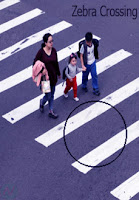 |
| Zebra crossing |
Ø Zebra crossing [a place on a road, especially one where there is a lot of traffic, across which wide black and white lines are painted, and at which vehicles must stop to allow people to walk across the road] (জেবরা ক্রোসিং):
Ø Vehicle / ˈviːəkl / (ˈভীএক্ল্) n [a machine usually with wheels and an engine, which is used for transporting people or goods on land, especially on roads, such as a car or lorry/truck etc.] (যান; যানবাহন; বাহন): Are you the driver of this vehicle?
Bison
Bison / ˈbaɪsn / (ˈবাইছন্) n [a large wild animal of the cow family, but having a larger head and shoulder covered in hair. There are two types of bison, the N American (also called buffalo) and the European] (বন্য ষাড় বা মহিষ): a herd of bison
Wildebeest
Wildebeest / ˈwɪldəbiːst / (ˈউইল্ডএবীছ্ট্) n {Also. Gnu} [they also called gnu are actually a subspecies of the antelope, native to Africa. They live together in large herds in order to protect each other as on their own, they are defenseless and therefore vulnerable in the African wilderness. When danger is spotted, the wildebeest warn each other using groaning calls and then run together, creating a stampede, both to escape approaching predators and also to intimidate them] (নু-হরিণ):
Ø Defenceless / dɪˈfensləs / (ডিফেনছলএছ্) adj [describes people, animals, plants or things that are weak and unable to protect themselves from attack] (অসহায়; অরক্ষিত): The village is defenseless against attack.
Ø Spot / spɑːt / (স্পাঃট্) v {Pt. Pp. spotted / spɑːtɪd / (স্পাঃটিড্)} [to see or notice a person a thing, especially suddenly or when it is not easy to do so] (চিনতে পারা; দেখা): The police spotted him driving a stolen car.
Ø Groan / groʊn / (গ্রৌন্) v {Pt. Pp. groaned / groʊnd / (গ্রৌন্ড্)} [to make a long deep sound showing annoyed, upset or in great pain, or with pleasure] (<যন্ত্রণায়; হতাশায় বা দুঃখে> আর্তনাদ করা; গোঙানো): He tried to get up and groaned with pain.
<SYN> Moan
Ø Stampede / stæmˈpiːd / (স্ট্যাম্ˈপীড্) n [when many large animals or many people suddenly all move quickly and in an uncontrolled way, usually in the same direction at the same time, especially because of fear or excitement] (মানুষ বা প্রাণীর আকস্মিক আতঙ্কপীড়িত উর্দ্ধশ্বাসে ধাবণ): Two shoppers were injured in the stampede as shop doors opened on the first day of the sale.
Ø Escape / ɪˈskeɪp / (ইˈছকেইপ্) v {Pt. Pp. escaped / ɪˈskeɪpt / (ইˈছকেইপ্ট্)} [to get away from an unpleasant or dangerous situation] (মুক্তি পাওয়া; বেচে যাওয়া; এড়িয়ে যাওয়া): He was lucky to escape serious injury.
Ø Approach / əˈproʊtʃ / (এˈপরৌচ্) v {Pt. Pp. approached / əˈproʊtʃt / (এˈপরৌচ্ট্)} [to come near to Sth/Sb in distance or time] (নিকটবর্তী হওয়া): Winter is approaching.
Ø Predator / ˈpredətər / (ˈপ্রেডএটএর্) n [an animal that hunts, kills and eats other animals] (যে প্রাণী অন্যপ্রাণী কে হত্যা করে তার মাংস খায়; শীকারজীবী): Lions, wolves are a predator.
 |
| Predator |
Ø Intimidate / ɪnˈtɪmɪdeɪt / (ইনˈটিমিডেইট্) v [to frighten or threaten someone so that they will do what you want] (<কিছু করতে> বাধ্য করার জন্য ভয় দেখানো বা ত্রাসিত করা): He refused to be intimidated by their threats.
Elk
Elk / elk / (এলক্) n [elk is one of the largest species within the deer family. They average 225 to 241 kg, tall 4.3ft at the shoulder, and are 6.9feet from nose to tail. They live in the north of Europe, Asia, and N America. Bull elk lose their antlers each March, but they begin to grow them back in May] (এলক; বৃহদহরিন):
 |
| Antler |
Ø Antler / ˈæntlər / (ˈএ্যানটলএর্) n [a horn with parts like branches which grows on the head of a male deer] (<পুং হরিণ মতো কয়েক জাতীয় প্রাণীর> শিং): Poachers in search of antlers prey on red deer.
Deer
Deer / dɪr / (ডিএর) n [an animal with long legs, that eats grass, leaves, etc. and can run fast. They are found in the forests of Europe, Asia, and North America. There are many types of deer such as white-tailed deer, mule deer, elk, moose, red deer, reindeer, fallow deer, and roe deer. The male deer antlers regrow every year, a little like the skin of a snake. The female is called a hind or a doe and the male a stag or buck] (হরিণ; মৃগ):
Ø Doe / doʊ / (ডৌ) n [a female deer] (স্ত্রী হরিণ):
Ø Stag / stæg / (স্ট্যাগ্) n [a male deer] (পুং হরিণ):
Reindeer
Reindeer / ˈreɪndɪr / (ˈরেইনডিএর) n [a large deer with long antlers (=horns shaped like branches), they inhabit both the Arctic Tundra and the North Pole regions which include parts of North America, Europe, and Asia. Their hooves adapt to the season so in the summer when the Tundra is soft and wet, the Reindeer pads of the foot become a sponge-like in order to get a bigger surface area on the damp group. In the winter the Reindeer foot shrink and tighten, exposing the rim of the hoof which cuts into the ice and crusted snow to stop the reindeer from slipping] (বল্গাহরিণ): Father Christmas travels in a sleigh pulled by reindeer.
Ø Arctic / ˈɑːrktɪk / (আঃর্কটিক্) n the Arctic [the most northern part of the world around the North Pole, which is very cold] (উত্তর মেরু বা সুমেরু অঞ্চল বিষায়ক): Polar bears live in the Arctic.
Ø Tundra / ˈtʌndrə / (ˈটানড্রএ) n [the large flat Arctic regions of northern Europe, Asia and N America where no trees grow and where the soil below the surface of the ground is always frozen] (<উত্তর ইউরোপ, এশিয়া ও উত্তর আমেরিকার> মেরু অঞ্চলের দিগন্তবিস্তৃত বৃক্ষহীন সমতল ভূমি; তুন্দ্রা আঞ্চল): Reindeer roam the tundra in large herds.
 |
| Pad |
Ø Pad / pæd / (প্যাড্) n [the soft part under the foot of a cat, dog, etc.] (<কুকুর, বেড়াল ইত্যা> পায়ের তলার তুলতুলে অংশ): A cat detects vibrations through the pads of its feet.
Ø Shrink / ʃrɪŋk / (শ্রিঙ্ক্) v {Pt. shrank; Pp. shrunk} [to become or to make Sth smaller in size or amount] (সঙ্কুচিত হওয়া বা ছোট হওয়া): The tumor had shrunk to the size of a pea.
Ø Rim / rɪm / (রিম্) n [the edge of Sth in the shape of a circle] (বৃত্তাকার কোনোকিছুর প্রান্ত): My reading glass has wire rim.
Ø Crust / ˈkrʌst / (ˈক্রাছ্ট্) n [a hard layer or surface, especially above or around Sth soft or liquid] (<কোনোকিছু> কঠিন উপরিভাগ): a thin crust of ice
<ADJ> Crusted / ˈkrʌstɪd / (ˈক্রাছটিড্) adj [having a hard layer or covering of Sth] (শক্ত আবরণে আবৃত):
Antelope
Antelope / ˈæntɪloʊp / (ˈএ্যান্টিলৌপ্) n [it is a deer-like mammal found in Africa, Eurasia. Unlike deer that renew their antlers annually. Antelope has strong permanent horns. They have long, thin legs which allow it to run very fast. There are many types of antelope] (এ্যান্টিলোপ; সারং; হরিণবিশেষ):
Ø Unlike / ˌʌnˈlaɪk / (ˌআনˈলাইক্) pre [different from] (মতো নয়): Unlike you, I’m not a great dancer.
Ø Renew / rɪˈnuː / (রিˈনূ) v [to begin Sth again after a pause or an interruption] (পুনরায় নতুন করে হওয়া):
Ostrich
Ostrich / ˈɑːstrɪtʃ / (ˈআঃছ্ট্রিচ্) n [a very large African bird with a long neck and two long legs, which cannot fly but can run very fast] (উটপাখি): The ostrich is the fastest animal on two legs.
Monkey
Monkey / ˈmʌŋki / (ˈমাঙ্কি) n [an animal that lives in hot countries, has a long tail and climbs trees. Monkeys are primates (=the group of animals which are most like humans). There are two ways to classify a monkey, the old world monkey, and the new world. They use different noises, facial expressions, and body movements to communicate with one another, with the monkey grinning being a sign of aggression. However, they express affection and make peace with others by grooming each other] (বানর; বাঁদর; মর্কট; কপি; শাখামৃগ):
Ø Primate / ˈpraɪmeɪt / (প্রাইমেইট্) n [any animal that belongs to the group of mammals that includes humans, apes, and monkey] (সর্বোচ্চ শ্রেণীর স্তন্যপায়ী প্রাণী <মানুষ, বানর, বনমানুষ প্রভৃতি এই শ্রেণীর অন্তর্গত>):
Ø Facial / ˈfeɪʃl / (ফেইশ্ল্) adj [connected with a person’s face] (মুখ সম্পর্কিত): a facial expression
Ø Grin / grɪn / (গ্রিন্) v [to smile widely] (দাঁত বেরকরে হাসা): What are you grinning about. Stop grinning and tell me what happened!
Ø Affection / əˈfekʃn / (এফেক্শ্ন্) n [the feeling of liking or loving Sb/Sth very much and caring about them] (স্নেহ; প্রেম; মমত্ব): Children need lots of love and affection.
Ø Groom / gruːm / (গ্রূম্) v [(of an animal) to clean the fur or skin of another animal or itself] (<প্রাণী সম্বন্ধে> লোম ও চামড়া বেছে দেওয়া বা পরিষ্কার করে দেওয়া): a female ape grooming her mate.
Baboon
Baboon / bæˈbuːn / (ব্যাˈবূন্) n [a type of large old World monkey is found in a variety of different habitats throughout Africa and in parts of Arabia. Which has a long pointed face like a dog and large teeth] (বেবুন; মর্কট; কুকুর-মুখো বাঁদর):
Ø Pointed / ˈpɔɪntɪd / (পয়নটিড্) adj [a pointed object has a thin sharp end or becomes much narrower at one end] (ছূচ্যাগ্র; চোখা): He’s got funny little-pointed ears. A pointed chin.
Chimpanzee
Chimpanzee / ˌtʃɪmpænˈziː / (ˌচিম্প্যানˈজী) n [a small, intelligent African ape native to sub-Saharan Africa. They are very closely related to Humans as we share 98% of the same DNA. They are thought to be the most intelligent animals on the planet after people and are not only known to show emotion, but they are also great problem-solvers] (শিম্পাঞ্জি):
Ø Ape / eɪp / (এইপ্) n [a large animal like a monkey, with no tail. There are different types of ape] (<গরিলা, শিম্পাজ্ঞি প্রভৃতি> লেজ বিহীন বানর): Chimpanzees and gorillas are both apes.
Gorilla
Gorilla / gəˈrɪlə / (গএˈরিলএ) n [they are ground-dwelling, mainly herbivorous apes that inhabit the forests of central Africa. They are the largest living primates of physical size. The DNA of Gorilla is highly similar to that of humans, from 95-99%, depending on what is counted, and they are the next closest living relatives to humans after the Chimpanzees and bonobos. They are not an aggressive animal as the gorilla is known to be shy and peaceful in nature] (গরিলা; বনমানুষ):
Ø Shy / ʃaɪ / (শাই) adj [(of animals) easily frightened and not willing to come near people] (<পশু সম্বন্ধে> ভীরু; দৃষ্টি এড়িয়ে চলে এমন): The deer was shy and hid behind some trees.
Orang-Utah
Orang-Utah / əˈræŋ- ətæn / (এˈর্যাঙ্ এট্যান্) n [a large ape with long arms are the most arboreal of the great apes and spend most of their time in trees. Their hair is typically reddish-brown, native to Indonesia and Malaysia. Orang-utan are currently found in only the rainforests of Borneo and Sumatra] (ওরাং ওটাং):
Ø Arboreal / ɑːrˈbɔːriəl / (আঃরˈবোরিএল্) adj [relating to trees; living in trees] (যে সব প্রাণী গাছে বাস করে; বৃক্ষবাসী): arboreal animals
Ø Rainforest / ˈreɪnfɔːrɪst / (ˈরেইনফোরিছ্ট্) n [a thick forest in tropical parts of the world that have a lot of rain] (বৃষ্টিপ্রধান ক্রান্তীয় অঞ্চলের জঙ্গল; ঘনবর্ষণ বনাঞ্চল): the Amazon rainforest
Gibbon
Gibbon / ˈgɪbən / (ˈগিবএন্) n [a small ape with long arms which lives in trees in the forests of S Asia] (উল্লুক):
Gray Langur
Gray langur / greɪ ˈlæŋgʊr / (গ্রেই ˈল্যাঙ্গুর্) n [Gray langur or Hanuman langur, the most widespread langurs of south Asia are largely gray, with a black face and ears. They are large and fairly terrestrial, inhabiting forest, open lightly wooded habitats, and urban areas on the Indian subcontinent] (হনুমান):
Ø Terrestrial / təˈrestriəl / (টএˈরেছট্রিএল্) adj [(of animals and plants) living on the land or on the ground rather than in water, in trees or in the air] (<প্রাণী ও গাছ সম্বন্ধে> স্থলচর): a terrestrial habitat
Ø Inhabit / ɪnˈhæbɪt / (ইনˈহ্যাবিট্) v [to live in a particular place] (বসবাস করা): These remote islands are inhabited only by birds.
Ø Urban / ˈɜːrbən / (ˈআর্বএন্) adj [connected with a town or city] (শহুরে): urban areas
<ANT> Rural (গ্রাম্য; গেঁয়ো)
Boar
Boar / bɔːr / (বোর্) n [they are also known as the wild swine or wild pig, native to the forests of Europe, north-west Africa and it is also found throughout Asia. The Boar is an extremely adaptable animal as it is found in a variety of different habitats, eat almost anything that will fit in its mouth and they do not only run fast but also swims well too] (বন্য শূকর):
Ø Swine / swaɪn / (সোয়াইন্) n [a pig] (শূকর; শুয়োর ২। শুয়োরের বাচ্চা):
Ø Pig / pɪg / (পিগ্) n [an animal with pink, black or brown skin, short legs, a broad nose and a short tail which curls around itself. Pigs are kept on farms for their meat (called pork) or live in the wild] (শূকর): Pigs were grunting and squealing in the yard.
Ø Adaptable / əˈdæptəbl / (এড্যাপটএব্ল্) adj [able or willing to change in order to suit different condition] (<যে কোনো পরিবেশ> মানিয়ে নিতে সক্ষম): The company provides highly adaptable business systems.
<SYN> Adjustable
Warthog
Warthog / ˈwɔːrthɑːg / (ˈয়োর্টহাঃগ্) n [an African wild pig with a large head, two large outer teeth called tusks and little raised areas on the male’s face that look like warts] (<আফ্রিকার কতিপয় জাতের শূকর এদের দুইটি বড়ো বড়ো দাঁত ও মুখে আঁচিলের মতো গুটিকা থাকে>আঁচিল-শূকর):
Ø Wart / wɔːrt / (য়োর্ট্) n [a small hard lump (=raised area) which grows on the skin, often on the face and hands and that is caused by a virus] (আঁচিল):
Civet
Civet / ˈsɪvɪt / (ˈছিভিট্) n [a small wild animal like a cat that lives in central Africa and southern Asia] (ভাম বা খাটাশ):
Otter
Otter / ˈɑːtər / (ˈআঃটএর্) n [a small animal that has four wedded feet (= with the skin between the toes), a tail and thick brown for which lives in revers and swims well and eats fish] (ভোঁদর):
Beaver
Beaver / ˈbiːvər / (ˈবীভএর্) n [an animal with smooth fur, sharp teeth, and a wide flat tail, they are most well-known for their distinctive home-building that can be seen in rivers and streams. They can build dams made of pieces of wood, twigs, leaves, and mud and are surprisingly strong. They use their large, flat shaped tails, to help with dam building and it also allows the beaver to swim at speeds of up to 30 knots per hour] (বিবর; একধরনের লোমশ জন্তু যা জলে ও স্থলে বাস করে (এই প্রানী দাঁত দিয়ে গাছ কেটে নদীতে ফেলে বাধ সৃষ্টি করতে পারে)): The beaver is an official symbol of Canada. The fur of the beaver is used in making hats and clothes.
 |
| Twig |
Ø Twig / twɪg / (টূইগ্) n [a small thin branch of a tree or bush, especially one removed from the tree or bush and without any leaves] (গাছের ছোট ডাল; উপশাখা; ফেঁকড়ি): We collected dry twigs to start the fire.
Polecat
Polecat / ˈpoʊlkæt / (ˈপৌল্ক্যাট্) n {Also skunk} [a small fierce wild animal that lives in Europe, Asia and North Africa, which has a long thin body with dark brown fur and strong, unpleasant smell] (গন্ধগোকুল; খট্টাশ):
Muskrat
Muskrat / ˈmʌskræt / (ˈমাছক্র্যাট্) n [a North American water animal that has a strong smell and is hunted for its fur] (গন্ধগোকুল <উত্তর আমেরিকার বৃহৎ ইদুর সদৃশ্য জলচর প্রাণী যার লোমশ চামড়া মূল্যবান>):
Mongoose
Mongoose / ˈmɑːŋguːs / (ˈমাঃঙ্গূছ্) n {Plu. mongooses // (মাঃঙ্গূছিজ্)} [it is a small rodent-like mammal, naturally found in Asia, Africa and parts of Europe but, Mongoose has also been artificially introduced to the Caribbean in more recent times] (বেঁজি; নেউল; নকুল):
Ø Introduce / ˌɪntrəˈduːs / (ˌইনট্রএˈডূছ্) v {Pt. Pp. introduced // (ইনট্রএডূছট্)} [to bring a plant, an animal or disease to a place for the first time] (চিনান; পরিচিত করান): Vegetation patterns changed when goats were introduced to the island.
Squirrel
Squirrel / ˈskwɜːrəl / (ˈস্কোয়ারএল্) n [a small rodent animal with a long thick and bushy tail with red, grey or black fur, large eyes, native to America, Eurasia, and Africa, and have been introduced to Australia. They eat nuts, berries, shoots and occasionally insects. Most squirrel hibernates during the colder winter months, for this time they store food in their dens during the autumn in preparation for the winter] (কাঠবিড়াল):
Ø Shoot / ʃuːt / (শূট্) n [the first part of a plant to appear above the ground as it develops from a seed, or any new growth on an already existing plant] (অঙ্কুর; লতাঙ্কুর): Two weeks before we had planted the seeds, little green shoots started to appear. Bamboo shoots.
Ø Hibernate / ˈhaɪbərneɪt / (ˈহাইবএরনেইট্) v [(of animals) to spend the winter in a state like deep sleep] (<কোনোকোনো প্রাণী সম্বন্ধে> গোটা শীতকালটা বিচেতন অবস্থায় কাটানো; শীতযাপন করা): The turtle hibernates in a shallow burrow for six months of the year.
Ø Den / den / (ডেন্) n [the hidden home of some types of a wild animal] (<জন্তুর> গুপ্ত আবাস; গুহা/ গর্ত): a bear’s den
Chipmunk
Chipmunk / ˈtʃɪpmʌŋk / (চিপ্মাঙক্) n [a small North American animal of the squirrel family, with fur and light and dark strips on its back] (উত্তর আমেরিকার ছোট ডোরা কাটা কাঠবিড়াল জাতীয় প্রাণী):
Hedgehog
Hedgehog / ˈhedʒhɔːg / (ˈহেজহোগ্) n [a small brown mammal, that is found in Europe, Asia, and Africa and has also been artificially introduced to New Zealand. It is around 25cm long, with stiff parts, needles covering its back. It can itself by curling its body into a ball so only the hedgehog spikes are exposed. This method keeps them safe from predators] (শল্লকী; কাঁটাচুয়া):
Ø Stiff / stɪf / (স্টিফ্) adj [firm and difficult to bend or move] (শক্ত; কঠিন; অনমনীয়): The handle on this door is rather stiff.
Ø Curl / kɜːrl / (কা্র্ল্) v [to form or make Sth form into a curved shape] (কুঞ্চিত করা; গোলাকার করা): The cat curled into a ball and went to sleep.
Ø Spike / spaɪk / (স্পাইক্) n [a narrow thin shape with a sharp point at one end, or something, especially a piece of metal, wood, etc. with this shape] (পেরেক; সূচ্যগ্রবস্তু): There were large spikes on top of the railing to stop people climbing over them.
Porcupine
Porcupine / ˈpɔːrkjupaɪn / (ˈপোর্কিউপাইন্) n [it is one of the world largest rodents, with weigh about 12kh, is found inhabiting the forests of Asia, Europe, part of Africa and America. The porcupine has a coat of long spikes to protect itself from danger. The shape, needle-like quills are about 7cm long and can be detached very easily. Porcupine is thought to be from the same family as the Hedgehog but the DNA of the porcupine is not as old as that of the hedgehog] (সজারু):
Ø Quill / kwɪl / (কুইল্) n [one of the long sharp stiff spines on a porcupine] (সজারুর কাঁটা):
Badger
Badger / ˈbædʒər / (ˈব্যাজএর্) n [they are short-legged, short, fat-bodied, nocturnal omnivores animal, with grey fur and wide black and white lines on its head, and live in holes in the ground. They can run up to 30km an hour for a short period of time and have been known to successfully fight off bigger mammals such as wolves, coyotes, and bears] (ব্যাজার; গর্তবাসী):
Anteater
Anteater / ˈæntiːtər / (ˈএ্যান্টীটএর্) n [a mammal which eats ants or termites has no teeth. They can be five to seven feet long from nose to tail. They are found throughout the Southern Hemisphere, but are more common in Africa, Asia and part of Australia] (বনরুই; পিপীলিকাভুক):
Ø Hemisphere / ˈhemɪsfɪr / (ˈহেমিছফিএর্) n [one half of the earth, especially the half above or below the equator] (গোলার্ধ): the northern/southern hemisphere
The ANIMALS for kids - Wild Animals English Vocabulary
Noted From Wikipedia, Google Image, Cambridge & Oxford Dictionary










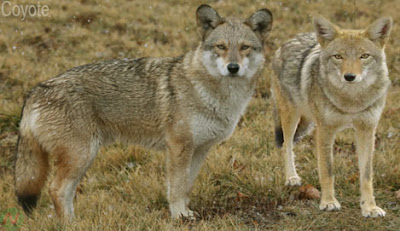
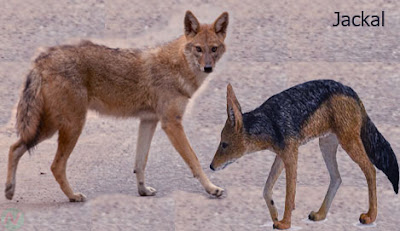





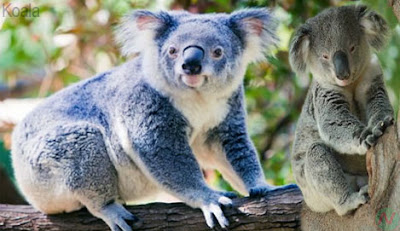



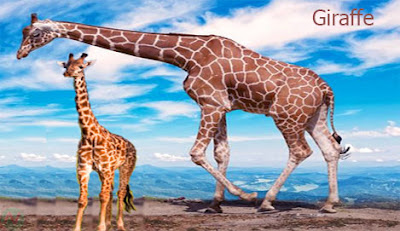






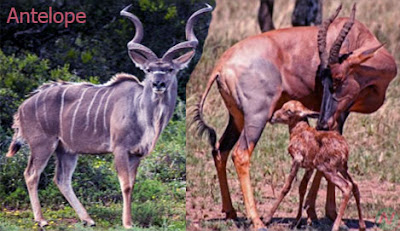
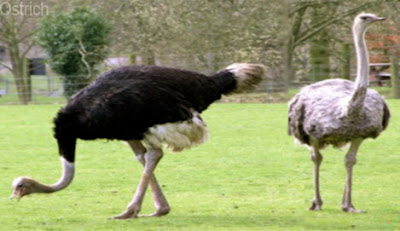



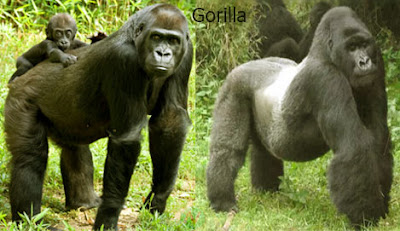
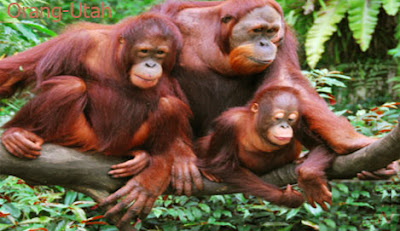

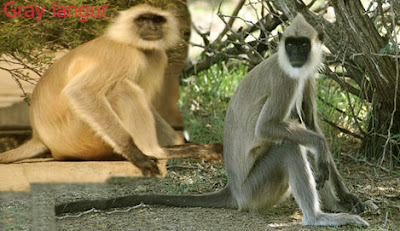




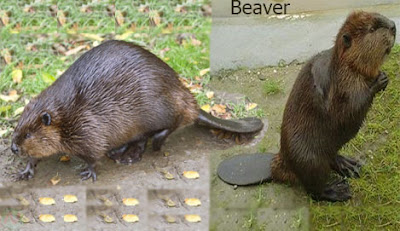



















No comments